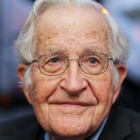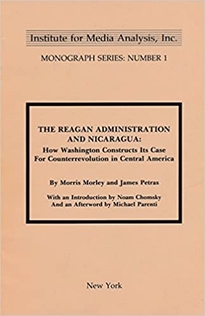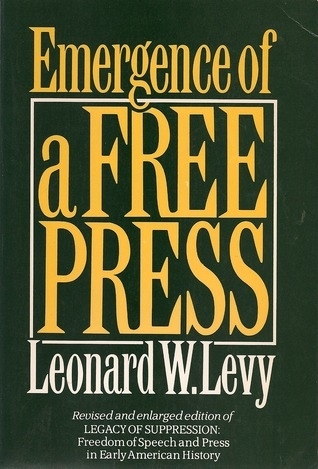
Noam Chomsky Books - 100 Recommended Picks
Noam Chomsky
There is a famous Noam Chomsky book list consisting of top 100 books Noam Chomsky ever recommended and mentioned. It is the full Noam Chomsky book list.
Noam Chomsky is a highly-regarded linguistics professor, one of the most prominent minds to live in our time.
Not only he is active in terms of his academic influence, but he is also a political activist who never stops before telling the truth.
Noam Chomsky is a genuine intellectual. He revolutionized linguistics with his non-empiricist language theory, and after that, he continued expressing his talents in the field of social and political studies.
He is an extremely well-read person, so Noam Chomsky book recommendations are valuable for those who seek to enrich their library with books on serious and timeless topics.
He is also known for his sharp ideas on society, politics, and his deeply philosophic approach to any books and discussions.
Justice and truth are the main concepts that guide Noam Chomsky. You will notice it in the Noam Chomsky book list: the pieces show various opinions on the same topic.
He is not afraid to defend the truth. Noam Chomsky has spoken a lot throughout his life defending justice and uncovering fraud or corruption schemes.
Professor Chomsky is a man that stands behind his ideas no matter what political powers are dominant at that time.
Noam Chomsky book recommendations are perfect for those looking to deeply dive into the political, linguistic, or sociological matters and observe the subject from multiple standpoints.
Noam Chomsky book list is a thoroughly curated selection of books that encourage and develop critical thinking.
So, take a glimpse to the library of Noam Chomsky - an unparalleled author and scientist.
See all
0
likes
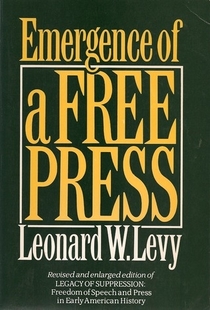
Emergence of a Free Press
Emergence of a Free Press (9781566635608): Levy, Leonard W.: Books
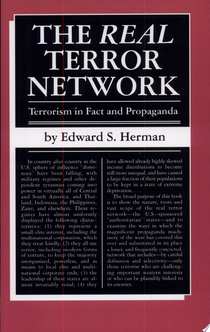
The Real Terror Network
A devastating expose of U.S. foreign policy which separates the myth of an "international terrorist conspiracy" from the reality.
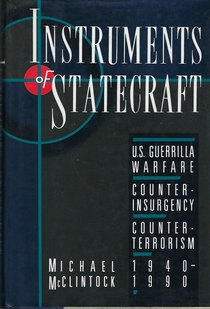
Instruments of Statecraft
Uses recently declassified documents to survey the American use of covert warfare against terrorists and adversarial states
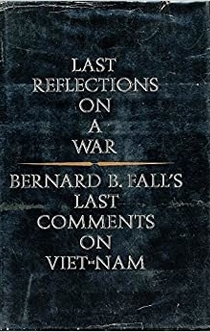
Last Reflections On a War: Bernard B. Fall's Last Comments on Viet-Nam
Last Reflections On a War: Bernard B. Fall's Last Comments on Viet-Nam [Bernard B. Fall, Dorothy Fall] on Amazon.com. *FREE* shipping on qualifying offers. Last Reflections On a War
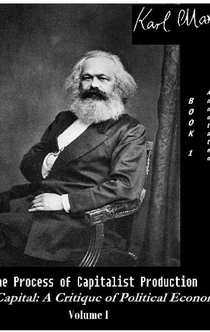
The Process of Capitalist Production - Capital: A Critique of Political Economy, Vol. I (Annotated)
Capital, Volume I (1867) is a critical analysis of political economy, meant to reveal the contradictions of the capitalist mode of production, how it was the precursor of the socialist mode of production and of the class struggle rooted in the capitalist social relations of production. The first of three volumes of Das Kapital, Kritik der politischen Ökonomie (Capital: Critique of Political Economy) was published on 14 September 1867, dedicated to Wilhelm Wolff and was the sole volume published in Marx’s lifetime.
See all

Conflicting Missions
This is a compelling and dramatic account of Cuban policy in Africa from 1959 to 1976 and of its escalating clash with U.S. policy toward the continent. Piero Gleijeses's fast-paced narrative takes the reader from Cuba's first steps to assist Algerian rebels fighting France in 1961, to the secret war between Havana and Washington in Zaire in 1964-65--where 100 Cubans led by Che Guevara clashed with 1,000 mercenaries controlled by the CIA--and, finally, to the dramatic dispatch of 30,000 Cubans to Angola in 1975-76, which stopped the South African advance on Luanda and doomed Henry Kissinger's major covert operation there. Based on unprecedented archival research and firsthand interviews in virtually all of the countries involved--Gleijeses was even able to gain extensive access to closed Cuban archives--this comprehensive and balanced work sheds new light on U.S. foreign policy and CIA covert operations. It revolutionizes our view of Cuba's international role, challenges conventional U.S. beliefs about the influence of the Soviet Union in directing Cuba's actions in Africa, and provides, for the first time ever, a look from the inside at Cuba's foreign policy during the Cold War."Fascinating . . . and often downright entertaining. . . . Gleijeses recounts the Cuban story with considerable flair, taking good advantage of rich material.--Washington Post Book World"Gleijeses's research . . . bluntly contradicts the Congressional testimony of the era and the memoirs of Henry A. Kissinger. . . . After reviewing Dr. Gleijeses's work, several former senior United States diplomats who were involved in making policy toward Angola broadly endorsed its conclusions.--New York Times"With the publication of Conflicting Missions, Piero Gleijeses establishes his reputation as the most impressive historian of the Cold War in the Third World. Drawing on previously unavailable Cuban and African as well as American sources, he tells a story that's full of fresh and surprising information. And best of all, he does this with a remarkable sensitivity to the perspectives of the protagonists. This book will become an instant classic.--John Lewis Gaddis, author of We Now Know: Rethinking Cold War HistoryBased on unprecedented research in Cuban, American, and European archives, this is the compelling story of Cuban policy in Africa from 1959 to 1976 and of its escalating clash with U.S. policy toward the continent. Piero Gleijeses sheds new light on U.S. foreign policy and CIA covert operations, revolutionizes our view of Cuba's international role, and provides the first look from the inside at Cuba's foreign policy during the Cold War.-->
See all
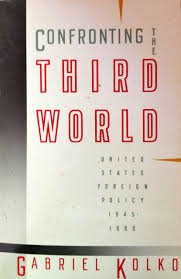
Confronting the Third World
Analyzes U.S. foreign policy towards the Middle East and Latin America, and argues that the U.S. has often created political instability
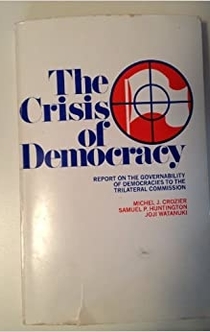
The Crisis of Democracy: Report on the Governability of Democracies to the Trilateral Commission
The Crisis of Democracy: Report on the Governability of Democracies to the Trilateral Commission [Crozier, Michel, Huntington, Samuel P., Watanuki, Joji]

Reflections on the Cuban Missile Crisis
The Soviet response to the first edition of Reflections has been a prime example of the new openness under glasnost in discussing previously taboo subjects. Using new revelations—such as the fact that Moscow had twice as many troops in Cuba as the Kennedy administration believed—from key Soviet and Cuban Sources, Garthoff has revised his earlier analysis to produce the most accurate, eye-opening story yet of the 1963 crisis. In this book Raymond L. Garthoff, a participant in the crisis deliberations of the U.S. government, reflects on the nature of the crisis, it's consequences, and it's lessons for the future. He provides a unique combination of memoir, historical analysis, and political interpretations. He gives particular attention to the aftermath and "afterlife" of the crisis and to its bearing on current and future policy. In the first edition of the book in 1987 the Garthoff presented a number of facts for the first time. Since then, more information has become available, particularly form Soviet sources, in part from conferences in which Garthoff participated but even more from individual interviews and research. This new information, much of it presented here in this volume for the first time, helps to fill in gaps in our knowledge about events and motivations on the Soviet side. More importantly, it enlarges our understanding of the crisis interaction.
See all

Intervention: How America Became Involved in Vietnam: George McT
Intervention: How America Became Involved in Vietnam [George McT. Kahin]
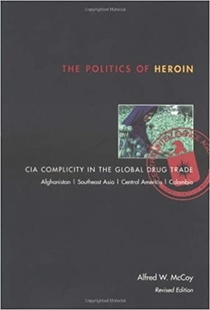
The Politics of Heroin
The first book to prove CIA and U.S. government complicity in global drug trafficking, The Politics of Heroin includes meticulous documentation of dishonesty and dirty dealings at the highest levels from the Cold War until today. Maintaining a global perspective, this groundbreaking study details the mechanics of drug trafficking in Asia, Europe, the Middle East, and South and Central America. New chapters detail U.S. involvement in the narcotics trade in Afghanistan and Pakistan before and after the fall of the Taliban, and how U.S. drug policy in Central America and Colombia has increased the global supply of illicit drugs.
See all

Requiem for Revolution
"Let us once again transform the American continent into a vast crucible of revolutionary ideas and efforts..." urged President John F. Kennedy on March 13, 1961. "Let us once again awaken our American revolution until it guides the struggle of people everywhere--not with an imperialism of force or fear, but the rule of courage and freedom and hope for the future of man." Similar calls stirred Latin America. In Brazil, it came from left-wing politicians, intellectuals, labor leaders, and students. The revolution on April Fool's Day, 1964 was not exactly the one the Brazilian Left had sought. Nor was the uncontested military coup the victory of courage and freedom and hope that Kennedy had called for. Still, it did bear an American and notably anticommunist imprint. Kennedy had pressed his aides to define a new doctrine called for covert operations to get conservative anticommunists elected to the Brazilian Congress, to arm and train anticommunist guerrillas, and to mobilize businessmen, military officers, housewives, priests, and students in an anticommunist crusade. Simultaneously there was to be overt pressure on the Brazilian government by State Department officials and by special White House emissaries. When the suspect Brazilian president was overthrown by the military, Washington hastily embraced the new regime. Generous support for the dictatorship continued for the remainder of the 1960s, despite the regime's use of torture and terrorist death squads and its systematic deprivation of the civil and political rights of its citizens. The pattern did not have to be reinvented for Central American in the 1980s.
See all
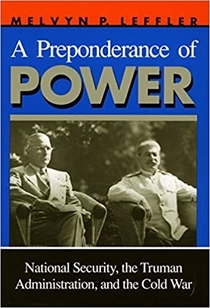
A Preponderance of Power: National Security, the Truman Administration, and the Cold War
In the United States the Cold War shaped our political culture, our institutions, and our national priorities. Abroad, it influenced the destinies of people everywhere. It divided Europe, split Germany, and engulfed the Third World. It led to a feverish arms race and massive sales of military equipment to poor nations. For at least four decades it left the world in a chronic state of tension where a miscalculation could trigger nuclear holocaust.Documents, oral histories, and memoirs illuminating the goals, motives, and fears of contemporary U.S. officials were already widely circulated and studied during the Cold War, but in the 1970s a massive declassification of documents from the Army, Navy, Air Force, the Joint Chiefs of Staff, the Department of Defense, and some intelligence agencies reinvigorated historical study of this war which became the definitive conflict of its time. While many historians used these records to explore specialized topics, Melvyn Leffler marshals in this book the considerable available evidence to offer an overall analysis of national security policy during the Truman years and a comprehensive history of that administration’s progressive embroilment in the Cold War.A Preponderance of Power won the 1992 Robert H. Ferrell Book Prize sponsored by The Society for Historians of American Foreign Relations (SHAFR), the 1992 Herbert Hoover Book Award sponsored by The Herbert Hoover Presidential Library Association and the 1993 Bancroft Prize sponsored by the Friends of the Columbia Libraries.“Each generation, if it is lucky, is given a book that becomes standard for one of the turning-point eras in American history. The immediate post-1945 years certainly were such an era, and Leffler’s work is such a book. Having exhausted the U.S. records, taken the globe as his province, and exploited the perspective of Communism’s recent collapse, he has written the account from which others must move if they are to contribute to our further understanding of these origins of the cold war.” — Walter LaFeber, Noll Professor of History, Cornell University“This is a magnificent book. It transcends forty years of historical writing about the origins of the cold war and the evolution of the Truman administration’s policies. Scrupulously documented, it will inevitably become the intellectual fulcrum around which all discussions, arguments, and revisions of cold war historiography henceforth will turn.” — Martin J. Sherwin, Dickson Professor of History, Director of the Nuclear Age History and Humanities Center, Tufts University“This bold, persuasive book puts the self-conscious expansion of U.S. power where it belongs — at the center of cold war tensions. Leffler effectively establishes that the ‘wise men’ had a coherent world view, devised a grand strategy to satisfy it, and extended U.S. power abroad to meet threats they exaggerated. A gem of a book.” —Thomas G. Paterson, Professor of History, University of Connecticut“Leffler’s panoramic survey of global developments offers an important reassessment of American policy in the early cold war — one that sees American policy driven as much by an expansive definition of national security as by the threat of Soviet imperialism. As the cold war comes to an end, Leffler presents a fresh appraisal of its origins.” — Michael J. Hogan, Professor of History, Ohio State University, Editor, Diplomatic History“Magisterial... This book is without question a major achievement. It is a masterly work of synthesis, weaving together in a single coherent study the various and often contradictory trends in previous historical writing on the Cold War’s origins. It is indefatigably researched... and most important, it is an intellectually honest work... A fine book.” — The Atlantic“A brilliant new book... An invaluable contribution.” — The Nation“[A Preponderance of Power] remains today [November 2013] the (so-far) definitive history of US behavior in the Cold War” — Eric Alterman, The Nation“The best book to date on the Truman administration and the origins of the Cold War.” — Detroit Free Press“A Preponderance of Power will be of immense value to scholars interested in the grand strategy of the Truman administration. Leffler has combined a solid grasp of secondary material with a comprehensive and very carefully documented analysis of primary sources, including a vast array of previously classified documents. The result is not only a more complete record of U.S. policymakers’ thinking about national security but also a more nuanced and sophisticated reconstruction of their concerns and objectives” — Alan C. Lamborn, American Political Science Review“A monumental work, rich in information and insights.” — R.C. Grogin, Canadian Journal of History“This massive distillation of the perceptions and policy prescriptions of the national security establishment of the Truman years... is policy history based on years of exhaustive research in government archives and private papers... Leffler’s judgment on Truman’s men and their work is favorable: they were sometimes very wise, nearly always prudent... and foolish primarily in overvaluing the strategic importance of peripheral areas.” — Gaddis Smith, Foreign Affairs“A good, indeed excellent, narrative history, straightforward and chronological... As a comprehensive and well-documented narrative of the Truman administration’s response to historic challenges beyond our shores, this book will prove indispensable as an up-to-date guide to further research.” — George Botjer, History“Leffler’s magisterial history of U.S. security policy in the Truman administration... will be widely appealing to political scientists and others grappling with issues in U.S. postwar security and foreign economic policy... Leffler has achieved a powerful synthesis of competing explanations of U.S. Cold War policy and has strongly elucidated U.S. grand strategy... A Preponderance of Power is a highly ambitious, thoughtful, and important work of scholarship, indisputably the outstanding historical synthesis of U.S. foreign policy in the early Cold War era.” — Lynn Eden,International Security“A remarkable piece of work. The book’s sweep is encyclopedic: it covers both military and foreign policy for the entire period from 1945 to January 1953, and deals systematically with American policy in all the important areas of the world--eastern and western Europe, the Mediterranean, the Middle East, and the Far East as well. The book is based on a vast amount of archival research...” — Marc Trachtenhexg, Orbis“What sets Leffler’s work apart from that of most of his predecessors is not only its comprehensive coverage of Cold War issues, its exhaustive — at least in American sources — research, and incisive prose, but also the effective integration of political, ideological, economic and strategic analysis.” — Stephen J. Randall, International Journal: Canada’s Journal of Global Policy Analysis“Massive, brilliant post-glasnost analysis of early cold-war realities... This study of how Truman dealt with a world sealed off to him by FDR is a book and a half.” — Kirkus“Offering a new slant on the early years of the Cold War, this major reassessment traces the development of national security policy during the Truman administration. Based on a rich vein of recently declassified material, Leffler’s majestic study describes how Harry Truman and his advisers sought to mobilize America’s power in order to deal with the dangers of the postwar world and create a global environment hospitable to U.S. interests and values.” — Publishers Weekly“In examining the formulation of policy during the Truman administration, Leffler concentrates on the small group of (now unfashionably elite, white, and male) individuals who exercised decision-making responsibility in the late 1940s and early 1950s... We get to know Leffler’s main characters—Harry Truman, Dean Acheson, Nitze, James Forrestal, John McCloy, and half a dozen others—very well. We learn how they saw the world and what they aimed to accomplish... Leffler’s book, [...] is by far the best on its subject.” — H. W. Brands, American Historical Review“Leffler’s timely book is the product of more than a dozen years of prodigious research and patient investigations into many recently available collections of documents. The result is a valuable assessment of prudent policymakers who formulated the blueprints for US Cold War strategies... Leffler’s interpretation will remain a standard resource for years to come.” — S. Prisco III, Choice Review
See all

Inevitable Revolutions
This book explains the history of US/Central American relations, explaining why these countries have remained so overpopulated, illiterate and violent; and why US government notions of economic and military security combine to keep in place a system of Central American dependency. This second edition is updated to include new material covering the Reagan and Bush years, and the Iran/Contra affair.
See all

In the Name of Democracy
00 This is the first comprehensive, even-handed examination of U.S. policy in Latin America during the Reagan era. Drawing on interviews with United States officials and his own perspective as a former State Department lawyer, Carothers sheds new light on the much-discussed U.S. involvements in Nicaragua, El Salvador, and Panama, and turns up varied and often unexpected findings in less-studied countries such as Bolivia, Costa Rica, Paraguay, and Chile. This is the first comprehensive, even-handed examination of U.S. policy in Latin America during the Reagan era. Drawing on interviews with United States officials and his own perspective as a former State Department lawyer, Carothers sheds new light on the much-discussed U.S. involvements in Nicaragua, El Salvador, and Panama, and turns up varied and often unexpected findings in less-studied countries such as Bolivia, Costa Rica, Paraguay, and Chile.
See all
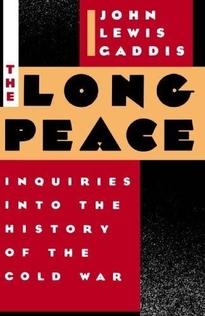
The Long Peace
In this fascinating new interpretation of Cold War history, John Lewis Gaddis focuses on how the United States and the Soviet Union have managed to get through more than four decades of Cold War confrontation without going to war with one another. Using recently-declassified American and British documents, Gaddis argues that the postwar international system has contained previously unsuspected elements of stability. This provocative reassessment of contemporary history--particularly as it relates to the current status ofSoviet-American relations--will certainly generate discussion, controversy, and important new perspectives on both past and present aspects of the age in which we live.
See all

Image and Reality of the Israel-Palestine Conflict
This acclaimed study surveys the dominant popular and scholarly images of the Israel-Palestine conflict. Finkelstein opens with a theoretical discussion of Zionism, locating it as a romantic form of nationalism that assumed the bankruptcy of liberal democracy. He goes on to look at the demographic origins of the Palestinians, with particular reference to the work of Joan Peters, and develops critiques of the influential studies of both Benny Morris and Anita Shapira. Reviewing the diplomatic history with Aban Eban's oeuvre as his foil, Finkelstein closes by demonstrating that the casting of Israel as the innocent victim of Arab aggression in the June 1967 and October 1973 wars is not supported by the documentary record. This new edition critically reexamines dominant popular and scholarly images in the light of the current failures of the peace process.
See all
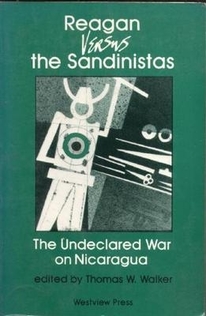
Reagan Versus The Sandinistas
The product of research and investigation by a team of sixteen authors, Reagan versus the Sandinistas is the most comprehensive and current study to date of the Reagan administration's mounting campaign to reverse the Sandinista revolution. The authors thoroughly examine all major aspects of Reagan's "low-intensity war," from the U.S. government's attempts at economic destabilization to direct CIA sabotage and the sponsorship of the contras or freedom fighters. They also explore less-public tactics such as electronic penetration, behind-the-scenes manipulation of religious and ethnic tensions, and harassment of U.S. Nicaraguan specialists and "fellow travelers." The book concludes with a consideration of the impact of these activities and their implications for international law, U.S. interests, U.S. polity, and Nicaragua itself. Reagan versus the Sandinistas is designed not only for courses on Latin America, U.S. foreign policy, and international relations, but also for students, scholars, and others interested in understanding one of the most massive, complex efforts—short of direct intervention—organized by the United States to overthrow the government of another country.
See all
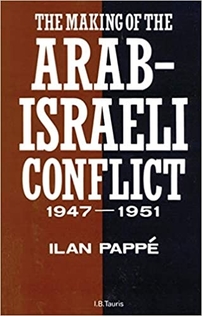
The Making of the Arab-Israeli Conflict, 1947-1951
Arabs and Jews describe the first Arab-Israeli war of 1948 in completely different ways. Among Arabs, and especially Palestinians, the events of that year are known as the ""nakba"" - the catastrophe, the trauma, the disaster. For Jews, and in particular for Israelis, their victory in the war of 1948 is a veritable miracle in which, against tremendous odds and through heroic military effort, the Jewish community succeeded in thwarting attempts by the Arab states to destroy it. This book integrates new archival material with the findings of recent scholarship to present the reader with a comprehensive and general history of the origins and consequences of the 1948 war. The author shows, in sharp contrast to the recollections and myths of both sides, that the military events of 1948 were not decisive. The victory of the Zionist organization and the fate of the Palestinians was determined by politicians on both sides - in the discussions and decisions of the United Nations in 1947-8 and in the Arab League - long before a shot had been fired. The author argues that Israel's failure to take advantage of the genuine opportunity for peace with the Arabs at the UN-sponsored Lausanne Conference in 1949 resulted in the prolonged and tragic conflict between Israel and the Arab states still very much alive today.
See all

Kennedy's Quest for Victory : American Foreign Policy, 1961-1963
Also available in paperback. Please see page 00 for a full description.
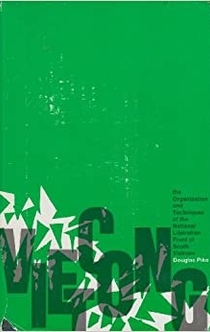
Viet Cong: The Organization and Technique of the National Liberation Front of South Vietnam
Viet Cong: The Organization and Technique of the National Liberation Front of South Vietnam [Pike, Douglas]
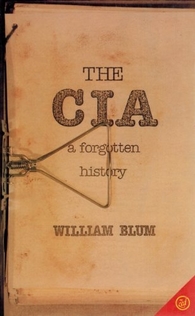
The CIA
"The CIA: a forgotten history tells the remarkable story of the CIA interventions in more thatn fifty countries, from the earliest actions in China to the present day campaign against Nicaragua. Investigative writer William Blum describes the grim role played by the Agency in overthrowing governments, preventing elections, assassinating leaders, suppressing revolutions, manipulating trade unions and manufacturing 'news' -- in detail that's never before appeared in one book. Blum also shows how the mainstream media have frequently not bothered to probe, highlight or even report many of America's aggressive actions abroad. Effectively, this has helped the US Government camoflague its operations and intentions abroad ever since World War II. Washington's deception and the media's laxity combine to leave us functionally illiterate about the history of modern US foreign policy. And that, the author believes, is good neither for democracy, nor for development and world peace. This immensely readable account has been carefully pieced together from widely disparate sources and with a scrupulous eye to documentation." --
See all
